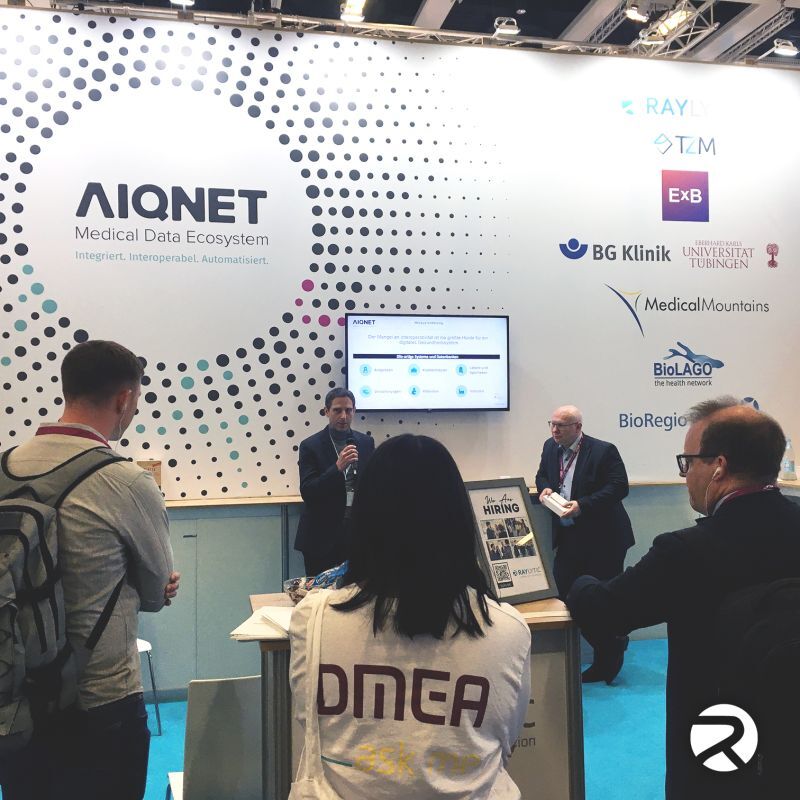From the 26th to 28th of April, RAYLYTIC and AIQNET presented interoperable solutions for the challenges of digitalizing healthcare in Germany at the DMEA—Connecting Digital Health. As Europe’s premier conference for digital healthcare, the DMEA again demonstrated that solutions for diverse problems and challenges in Germany’s healthcare system can be found in digitalization.
One of these solutions is RAYLYTIC´s core product UNITY, a web-based electronic data capture and clinical trial management software that automates data collection for medical device manufacturers, clinics, and research centers. UNITY OUTCOME allows users to design and collect patient reported outcomes (PROs) electronically.
RAYLYTIC & AIQNET: Advancing interoperability between technology, industry, and care
Many discussions and presentations at DMEA focused on interoperability, reinforcing the notion that most developed healthcare solutions require interoperable infrastructures.
RAYLYTIC and, for the first time, AIQNET—a federally funded medical data ecosystem initiated by RAYLYTIC—showcased how interoperability between technical systems and organizations outside primary care can look in practice. As a multilayered software platform, AIQNET provides access to clinical data in a decentralized, open architecture. Applications utilize the common data model and AI algorithms to facilitate the automated structuring of unstructured data, found for example in PDF reports and medical images. This allows the seamless and automated exchange of information between different stakeholders in healthcare.
Consolidating interoperability solutions
In light of the discussions surrounding interoperability at the DMEA, both RAYLYTIC and AIQNET welcome and support initiatives to adopt FHIR as the future interoperability standard for routine care in Germany.
RAYLYTIC’s managing director Frank Trautwein highlighted the need for the consolidation of interoperable solutions. Trautwein warned against overreliance on tailored solutions, stating: “We run the risk of enlarging information silos and increasing the dependence on specific solution providers, if the industry as a whole does not agree on uniform data models and protocols.”
In the global landscape, the implementation of open standards for transferring and processing data has accelerated the digitalization of healthcare systems. For example, the adoption of DICOM as the international standard for storing and exchanging medical imaging information 30 years ago shows how open standards streamline data processing pathways and reduce the formation of information silos.
RAYLYTIC and AIQNET would like to thank all our discussion partners for the enriching exchanges at the DMEA 2022.
What is the DMEA?
The DMEA is the central conference for healthcare digitalization in Europe. After three years of COVID-related absence from the trade fair grounds of Berlin, the conference returned to its live format last week. Under the motto of ‘Connecting Digital Health’, the DMEA is designed to facilitate exchange between all corners of the healthcare industry in Germany. Healthcare personnel, IT-industry, and legislators have the opportunity here to jointly evaluate the progress of Germany’s healthcare digitalization efforts on an international stage.
Compared to its last in-person iteration in 2019, this year’s DMEA witnessed a 4% increase in the number of participants. The conference halls bustled with more than 11,000 visitors, 300 speakers, and 500 exhibitors.
German minister of health, Prof. Dr. Karl Lauterbach, also served as a sponsor of this year’s DMEA. His opening keynote set the tone for the following three days of discussion and exchange. He kicked off the conference by highlighting the need of strategic expansion in Germany’s digital health infrastructure. Speaking on the inextricability of the advancement of the German healthcare sector with its digitalization, Lauterbach emphasized his commitment also as ‘minister of digitalization’ to garnering support for existing and emerging digital health solutions.
The DMEA 2022 generated largely positive reviews. Participants praised the enlightening exchanges between legislators, technology companies, and healthcare personnel. The DMEA will take place again in April 2023. We look forward to seeing you there!


